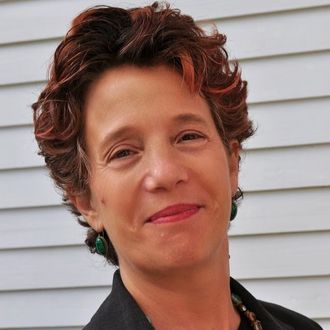
“It’s not a choice!” is a fundamental refrain of the gay-rights movement often echoed by both gay rights activists themselves and their allies. It adds a stark, clear line to the debate: You, the anti-gay-rights person, are punishing people for something they have no control over, just like their gender or the color of their skin. To casual observers of the movement and to its everyday allies, this might not seem like a controversial notion (it’s one I’ve certainly invoked dozens of time over the last decade), but Suzanna Walters, head of the gender and sexuality program at Northeastern University, sees things very differently.
In her newly released book The Tolerance Trap: How God, Genes, and Good Intentions are Sabotaging Gay Equality, Walters takes aim at what she calls the “born this way” argument, arguing that it has actually damaged the gay-rights cause, and that it has done so in part by embracing shoddy science that makes human sexual activity out to be a lot more straightforward and easily classified than they are in real life.
“Of course sexuality is not a choice in the same way that I’m sitting in my hotel room right now picking up a cup of coffee,” she said in an interview with Science of Us. “It’s a choice to do that, or a choice to wear this pair of shoes. That’s a good notion of choice. People feel and experience their sexuality in very deep and substantive ways, of course. But neither is it as simple and glib as some, you know, genome, some endocrine trigger. Sexuality is more complex than that. People change their sexuality over the long course [of their lives].”
Walters is fond of pointing out that many of the same activists who argue against the existence of major gender-based differences in human behavior eagerly embrace research supporting it when it comes to arguing that being gay is not a choice. “I think the science itself is actually very thin science,” she said. “It is based on gender-based sex differences and that kind of science which has been debunked ad nauseam by wonderful colleagues of mine, including folks like Rebecca Jordan Young.”
Part of the problem, she argues, is that the nuance and fluidity of human sexual experience makes it hard to effectively categorize and analyze. “You say, okay, I’m going to get some gay people and I’m going to test whether their brains are different or something,” Walters said. “You already presume to know what is gay and who is gay. If someone has desires to act on it, are they in that study’s sample? If they act on it, but they don’t declare themselves, they don’t feel that’s who they are in their everyday lives, are they in the sample? If they’ve had both sets of experiences, are they in the sample? If someone says, I’m a lesbian, but boy do I get turned on by gay male porn, are they in that sample? It narrows the vast complexity and richness of human sexuality to think that there is some simple one or the other way of looking at it: gay, straight, this desire, that desire. And it flies in the face of both our history and other cultural experiences.”
Walters also invokes history in her argument against “born this way”–ism. In the past, she said, efforts to reduce human beings to biologically defined categories have tended to have tragic results. “All you have to do is have a glancing notion of history and know that biological arguments for difference have been used by and large for oppression if not genocide,” she said. “So, the history of the Holocaust, you know, the history of slavery and racism, where we’re measuring people’s heads.”
Walters believes that tolerance of biological difference is simply too flimsy a foundation for a cause such as gay rights — and that that’s part of the reason other civil-rights movements have shied away from such arguments. “Look at the women’s movement, look at the black civil rights movements,” she said. “Neither of those movements relied on notions of immutability, on acceptance, on tolerance. They relied on notions of equality, of liberation, of freedom. We have that tradition in our country.”
Walters acknowledged the challenge she faces given how deeply ingrained in the LGBT discussion the “born this way” line is. “It has become — not just for gays but for liberal allies — the position you’re supposed to take,” she said, and arguing otherwise is often seen as akin to arguing against gay rights altogether. That’s why Walters said her book specifically targets straight allies: She hopes to convince them, “You don’t need to rely on flimsy science, on notions of compulsion, on notions of immutability, in order to make a strong case for civil rights.”




